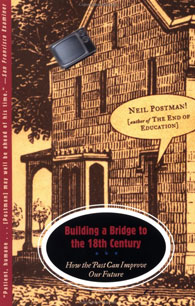
When the iPod first came out, I could not see why there was so much hoopla. Who needs a device to carry around 10000 songs? I certainly didn’t.
But then someone pointed out my drawer full of cassette tapes of sermons and conferences. Messages of great value that I never listen too because a) I no longer have a tape player and b) I cannot keep organized a hundred cds and tapes to access what I want when I want it.
The solution was the ipod. A hundred sermons or lectures and I’ve only used a third of my 4 gig Nano’s storage space. I do not play CDs anymore. It is just far too easy to carry one small unit with my hundreds of songs on it.
Geeky cool, of course. But useful as well.
Technology, however, can change us. We would be foolish to think it does not. We are a different world after the advent of the printing press; we are a different world because of television.

A Christian should not, it seems to me, be enslaved to technology, and a Christian should think carefully about the technology he embraces. Neil Postman, not Christian but Jewish I think, has written in provocative ways about the impact of technology, as a prophet trying to hold back the storm. In Amusing Ourselves to Death he chronicles the impact of television upon the way we think, and in Technopoly he expands his view to the impact of all kinds of technological ‘advance’.
My favorite statement from Postman on the subject comes from his very interesting book, Building a Bridge to the 18th Century. The book is challenging and useful in many ways, but this quote not only makes me smile, but drives me always to ask the question, “Do I really need this new technology?” It is more lengthy than I usually use, but I think you will enjoy it.
“I find it useful to ask of any technology that is marketed as indispensable, What problem does it solve for me? Will its advantages outweigh its disadvantages? Will it alter my habits and language, and if so, for better or for worse? My answers may not be yours, almost certainly are not yours. I write my books with pen and paper, because I have always done it that way and enjoy doing so. I do not have a computer. The Internet strikes me as a mere distraction. I do not have voice mail or call-waiting, both of which I regard as uncivil. I have access to a fax machine, but try to control my use of it. Snail mail is quite adequate for most of my correspondence, and I do not like the sense of urgency that faxes inevitably suggest. My car has cruise control, but I have never used it since I do not find keeping my foot on the gas pedal a problem.
“You get the idea. I will use technology when I judge it to be in my favor to do so. I resist being used by it. In some cases I may have a moral objection. But in most instances, my objection is practical, and reason tells me to measure the results from that point of view. Reason also advises me to urge others to do the same. An example: When I began teaching at NYU [New York University], the available instruments of thought and teaching were primitive. Faculty and students could talk, could read, and could write. Their writing was done the way I am writing this chapter–with a pen and pad. Some used a typewriter, but it was not required. Conversations were almost always about ideas, rarely about the technologies used to communicate. After all, what can you say about a pen except that you’ve run out of ink? I do remember a conversation about whether a yellow pad was better than a white pad. but it didn’t last very long, and was inconclusive. No one had heard of word processors, e-mail, the Internet, or voice mail. Occasionally, a teacher would show a movie, but you needed a technician to run the projector and the film always broke.
“NYU now has much of the equipment included in the phrase ‘high tech.’ And so, an eighteenth-century dinosaur is entitled to ask, Are things better? I cannot make any judgments on the transformations, if any, technology has brought to the hard sciences. I am told they are impressive, but I know nothing about this. As for the social sciences, humanities, and social studies, here is what I have observed: The books professors write aren’t any better than they used to be; their ideas are slightly less interesting; their conversations definitely less engaging; their teaching about the same. As for students, their writing is worse, and editing is an alien concept to them. Their talking is about the same, with perhaps a slight decline in grammatical propriety. I am told that they have more access to information, but if you ask them in what year American independence was proclaimed, most of them do not know, and surprisingly few can tell you which planet is the third from the sun. All in all, the advance in thought and teaching is about zero, with maybe a two- or three-yard loss.” [pages 55-56]
Good thoughts. But I’m sticking by my iPod.

A sinner's 2 cents
Hey Randy,Thanks for the post(man). I love that guy. He is an intelligent and thoughtful critic of our entertainment culture. I’ll have to check out his “Bridge to the 18th century”. It sounds interesting. Is it as good as “Amusing ourselves to Death”?Tom
Randy Greenwald
It would be hard to top “Amusing Ourselves to Death”. However “Bridge” is provocative and poses some challenges for how to do ministry in the current age. He is not a Christian, and he places too much confidence in the rationalism of those who have gone before us. However, it is a good book. I do recommend it.
Gus
I too like Postman; Amusing Ourselves to Death is worth a second read. I found it fascinating that though not a Christian he had such a good analysis and wrote an excellent critique of televanglism. His thoughts on US politics and elections were perceptive and, I think, quite exact.–adri